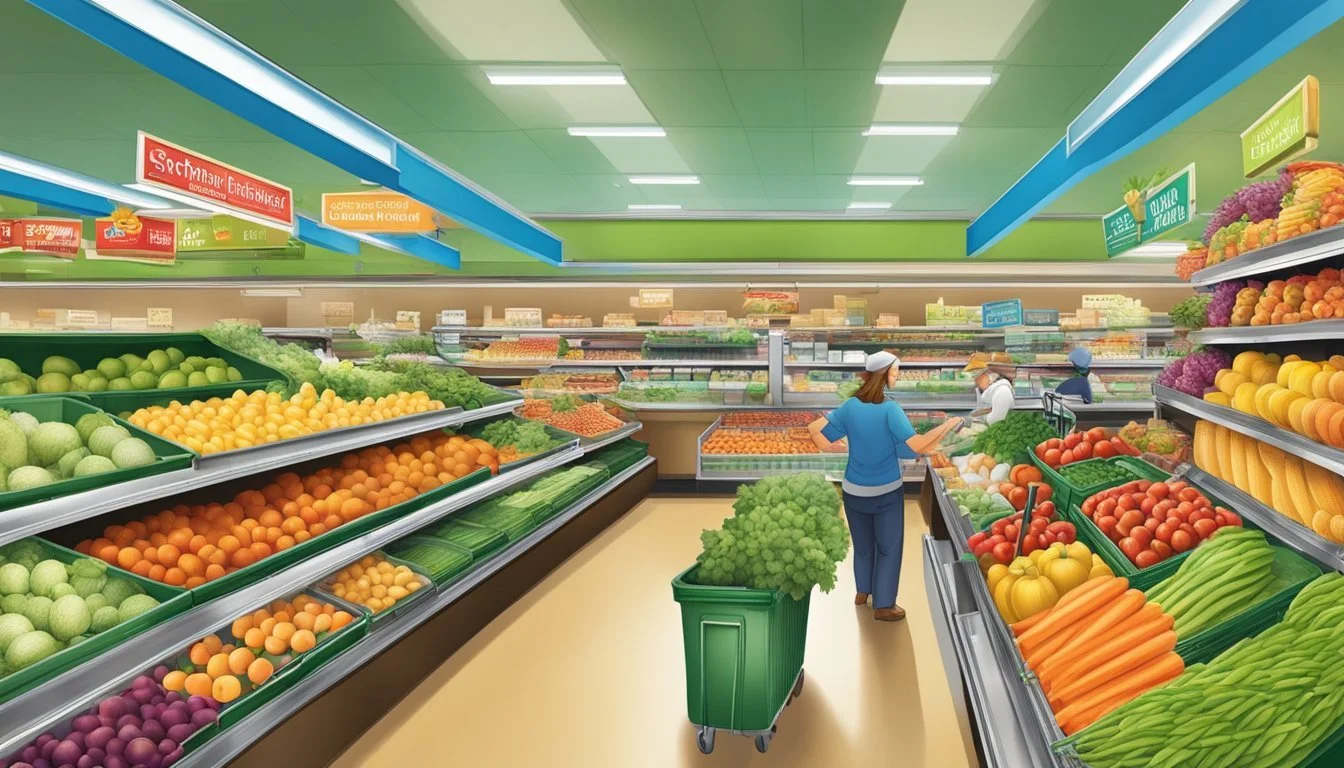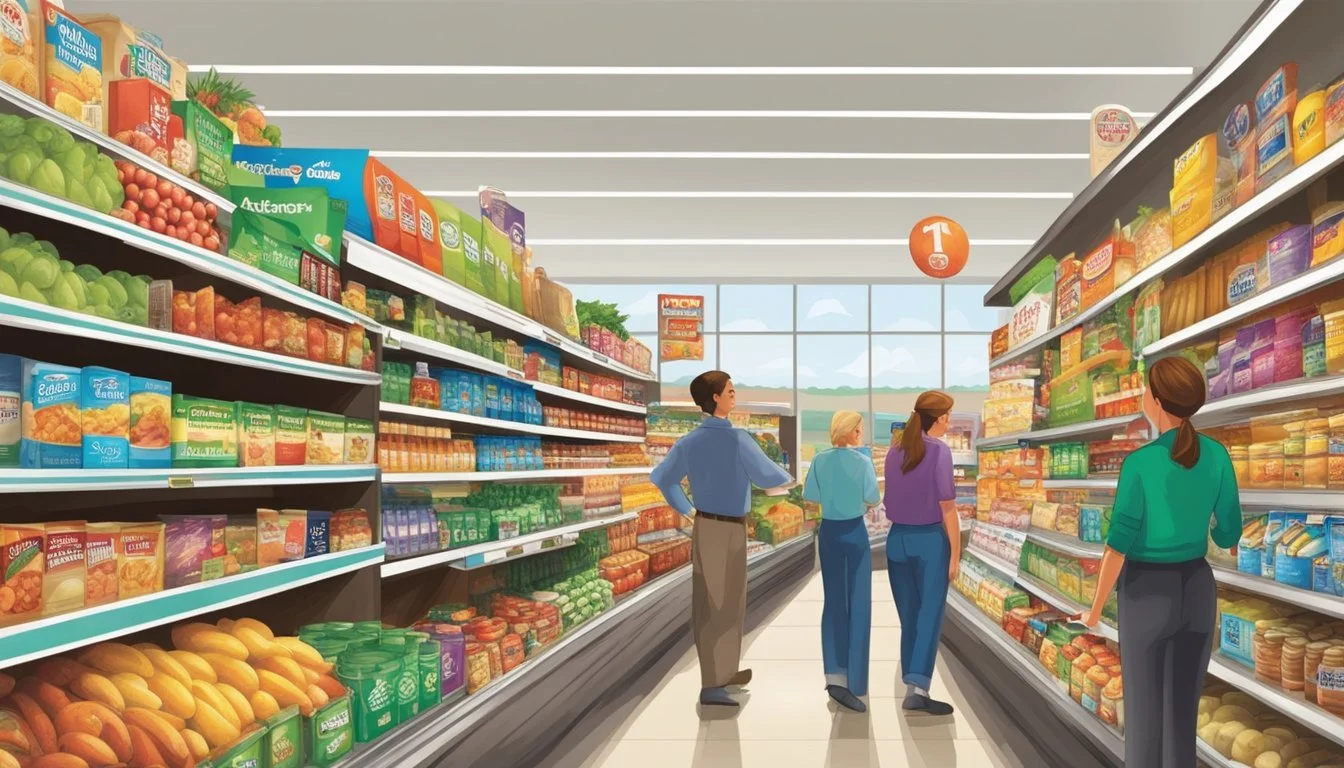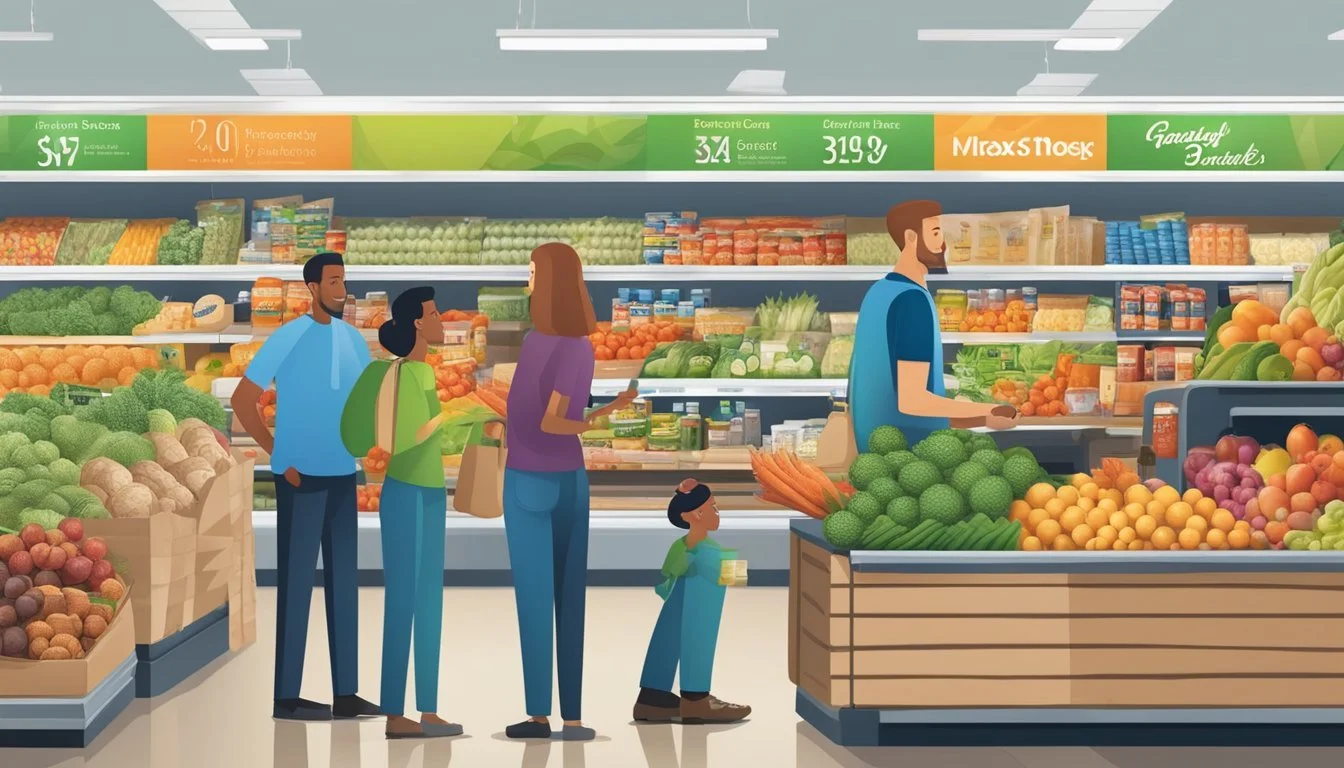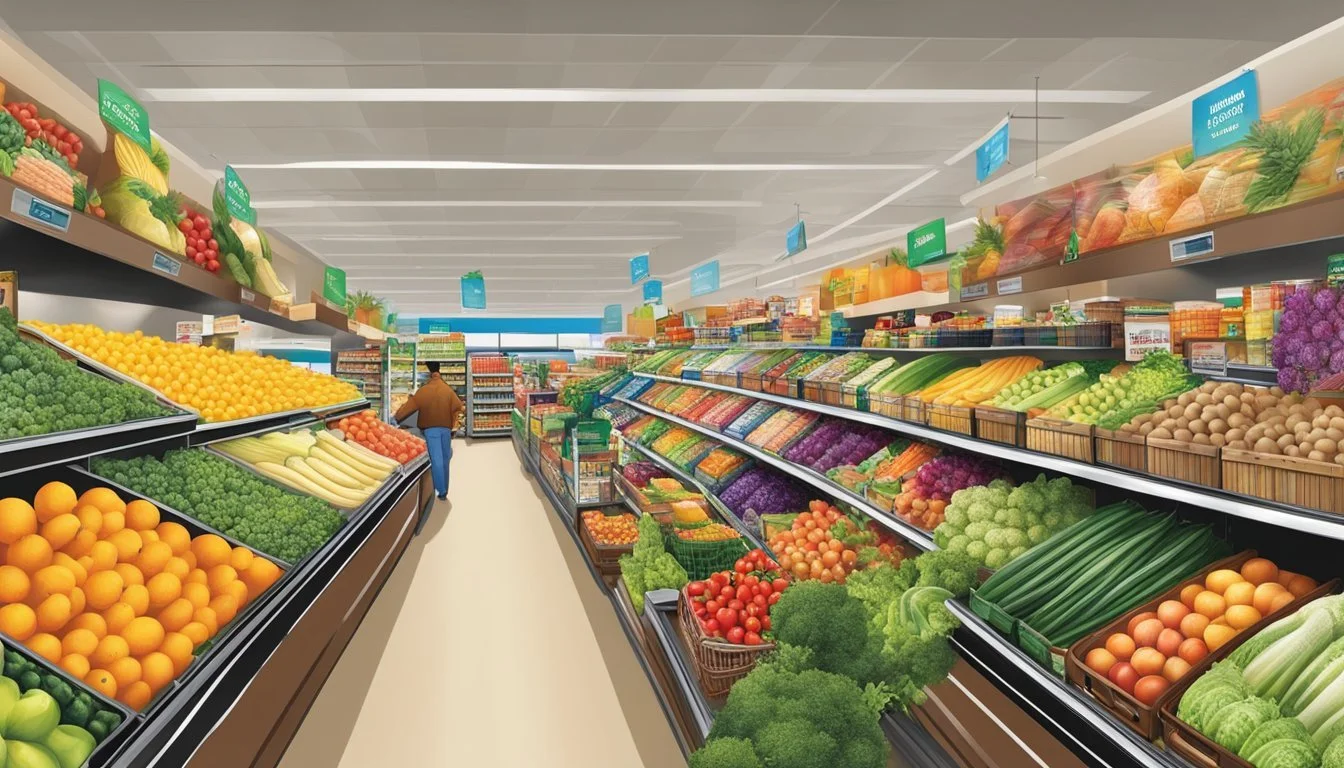Demoulas Market Basket vs FoodMaxx
Comparing Prices, Quality, and Selection
Grocery shopping is a crucial part of everyday life, and finding the best deals can make a significant difference in household budgets. Demoulas Market Basket and FoodMaxx are two supermarket chains known for their competitive prices. Both stores aim to provide affordable options for consumers, but they differ in their approaches and offerings.
Market Basket consistently offers lower prices across a wide range of products compared to FoodMaxx. This New England-based chain has built a reputation for maintaining affordability even during times of inflation. Market Basket's strategy of high-volume sales and low profit margins allows them to keep prices down while still providing quality products.
FoodMaxx, while also budget-friendly, focuses on a no-frills shopping experience to reduce costs. The store offers a mix of name-brand and private-label products, giving customers options at different price points. Despite its efforts, FoodMaxx generally comes in slightly higher on overall grocery bills when compared to Market Basket.
History and Background
The stories of Demoulas Market Basket and FoodMaxx showcase two distinct paths in American grocery retail. Both chains have deep roots in their respective regions and have experienced significant growth over the decades.
The Story of Demoulas Market Basket
Demoulas Market Basket traces its origins to 1917 when Greek immigrants Athanasios and Efrosini Demoulas opened a small grocery store in Lowell, Massachusetts. The store specialized in fresh lamb and catered to the city's diverse population.
Despite the challenges of the Great Depression, the business survived and thrived. In 1950, the Demoulas family expanded to a new superette location.
The company's real growth began in 1954 when brothers Telemachus and George Demoulas purchased the store from their parents for $15,000. Under their leadership, Market Basket expanded across New England.
Today, Market Basket operates 88 stores in Massachusetts, New Hampshire, Maine, and Rhode Island. The company remains family-owned, with its headquarters in Tewksbury, Massachusetts.
FoodMaxx Origins and Expansion
FoodMaxx, unlike Market Basket, has its roots in California. The chain was established in the 1980s as a warehouse-style grocery store concept.
FoodMaxx aimed to offer customers lower prices by reducing overhead costs. The stores featured a no-frills layout and focused on bulk purchases.
The chain expanded rapidly throughout California, appealing to budget-conscious shoppers. FoodMaxx later became part of The Save Mart Companies, a larger grocery retailer.
In recent years, FoodMaxx has continued to grow, opening stores in new markets. The company has adapted its model to meet changing consumer preferences while maintaining its commitment to value pricing.
Business Model and Ownership
Market Basket and FoodMaxx operate with distinct business models and ownership structures that shape their operations and customer experiences. Both companies take different approaches to management, cost control, and employee relations.
Demoulas Market Basket Approach
Market Basket is a family-owned business with a unique profit-sharing model. The company was founded by Greek immigrants Arthur and Efrosini Demoulas in 1917. Market Basket employs a cost-conscious approach, focusing on low prices and no-frills stores.
The company offers an employee profit-sharing plan, which has contributed to strong worker loyalty. This strategy has helped keep operating costs low while maintaining high employee satisfaction.
Market Basket experienced a significant ownership dispute in 2014. Arthur S. Demoulas and Arthur T. Demoulas, cousins and descendants of the founders, battled for control of the company. This conflict led to widespread employee protests and customer boycotts.
FoodMaxx Strategy and Structure
FoodMaxx operates as a subsidiary of The Save Mart Companies, a larger grocery corporation. The chain was established in 1986 as a warehouse-style, discount grocery store. FoodMaxx employs a low-cost business model, focusing on volume sales and minimal operating expenses.
The company uses a corporate structure typical of larger retail chains. This approach allows for centralized decision-making and standardized operations across stores. FoodMaxx stores are designed for efficiency, with a focus on keeping prices low for budget-conscious shoppers.
FoodMaxx's ownership has changed hands over the years. In 2020, the Blackstone Group acquired a majority stake in The Save Mart Companies, including the FoodMaxx brand. This shift to private equity ownership may influence the chain's future strategies and operations.
Store Facilities and Locations
Market Basket and FoodMaxx have distinct geographic footprints and store networks. Their locations and facilities reflect their regional focus and community presence.
Market Basket Presence in the Northeast
Market Basket operates 88 supermarkets across New England. The chain has deep Massachusetts roots, with stores in cities like Boston and Lowell. Market Basket's reach extends to neighboring states including New Hampshire and Maine. Their largest location is a 135,000-square-foot store in Chelsea, Massachusetts, employing 300 workers.
Market Basket stores are known for their wide aisles and extensive product selection. The company maintains strong ties to local communities, often becoming anchor tenants in shopping centers.
FoodMaxx Geographic Footprint
FoodMaxx has a more limited geographic presence compared to Market Basket. The chain focuses primarily on California, with some stores in other western states. FoodMaxx operates as a discount grocery format, emphasizing low prices and no-frills shopping experiences.
FoodMaxx stores are typically smaller than Market Basket locations. They feature simple layouts designed for efficient shopping. The company leverages its California base for distribution, allowing it to offer competitive pricing on fresh produce and other regional products.
Product Range and Quality
Market Basket and FoodMaxx offer distinct approaches to product selection and quality. Their strategies cater to different consumer preferences, with each store emphasizing specific aspects of their inventory.
Market Basket's Commitment to Quality
Market Basket prides itself on providing high-quality products at competitive prices. The chain focuses on freshness, particularly in its produce and meat departments. Their produce section features a wide variety of fruits and vegetables, sourced from local farms when possible. This approach ensures customers have access to seasonal, fresh items.
The meat department at Market Basket is known for its superior quality and selection. They offer a range of cuts, including organic and grass-fed options. Market Basket also maintains strict quality control measures, ensuring that meats are properly stored and displayed.
Store brands at Market Basket are carefully curated to match or exceed the quality of national brands. This commitment to quality extends across all departments, from dairy to bakery items.
FoodMaxx Assortment and Suppliers
FoodMaxx takes a different approach, focusing on providing a wide assortment of products at budget-friendly prices. The store offers a mix of national brands and private label items, giving customers more choices across various price points.
Their produce section, while not as extensive as Market Basket's, still provides a solid selection of fresh fruits and vegetables. FoodMaxx works with suppliers to ensure competitive pricing on produce items.
The store's meat department offers standard cuts at affordable prices. While the selection may not be as diverse as Market Basket's, FoodMaxx maintains quality standards for freshness and proper handling.
FoodMaxx's store brands provide value-conscious shoppers with lower-priced alternatives to national brands. These products cover a wide range of categories, from pantry staples to household items.
Pricing Strategies and Customer Perception
Demoulas Market Basket and FoodMaxx employ distinct pricing strategies that shape customer perceptions of value and affordability. These approaches influence shopping behaviors and loyalty among their respective customer bases.
Market Basket's Pricing Philosophy
Market Basket is renowned for its commitment to low prices and high-volume sales. The chain maintains consistently low prices across its product range, eschewing loyalty programs or frequent promotional sales. This straightforward approach appeals to budget-conscious shoppers seeking everyday value.
Market Basket's pricing strategy has earned it a reputation for affordability. In 2022, a consumer data study compared over 60 grocery chains on price competitiveness. Market Basket emerged as a top performer, rivaling larger competitors like Aldi and Walmart in terms of affordability.
The company's low-price guarantee extends beyond just the checkout total. Market Basket offers competitive wages and benefits to employees, fostering a positive shopping environment that enhances overall customer perception of value.
FoodMaxx and Competitive Pricing
FoodMaxx positions itself as a discount grocer, emphasizing "more for your dollar" in its marketing. The chain utilizes a no-frills approach to keep operating costs low, allowing for competitive pricing on a wide range of products.
FoodMaxx employs a high-low pricing model, featuring regular promotions and discounts to attract price-sensitive shoppers. This strategy creates a perception of savings opportunities, encouraging customers to seek out deals and compare prices actively.
The chain leverages its private label offerings to provide additional value. These store-brand products typically offer lower prices compared to national brands, appealing to customers looking to stretch their grocery budgets.
FoodMaxx's pricing strategy aims to position the store as a go-to destination for affordable groceries. By emphasizing savings and value, the chain seeks to build a loyal customer base among shoppers prioritizing price in their grocery decisions.
Customer Service and Shopping Experience
Market Basket and FoodMaxx offer distinct approaches to customer service and shopping experiences. Each chain prioritizes different aspects to cater to their target customers.
Service Culture at Market Basket
Market Basket is known for its strong customer-focused culture. Employees often go above and beyond to assist shoppers, creating a friendly atmosphere. The store emphasizes cleanliness and organization, making it easy for customers to navigate.
Market Basket's checkout process is typically efficient, with well-trained cashiers and baggers. The chain invests in staff training, resulting in knowledgeable employees who can answer product questions and provide recommendations.
Customer loyalty at Market Basket is notably high. Many shoppers appreciate the personalized service and community-oriented feel of the stores. This has contributed to positive consumer satisfaction ratings and word-of-mouth recommendations.
FoodMaxx's Approach to Service and Convenience
FoodMaxx focuses on providing a no-frills shopping experience with an emphasis on low prices. The stores are designed for efficiency, with a straightforward layout that allows customers to quickly find what they need.
While FoodMaxx may not offer the same level of personalized service as Market Basket, it aims to streamline the shopping process. Self-checkout options are available in many locations, catering to customers who prefer a faster, more independent experience.
FoodMaxx's customer service approach centers on maintaining competitive prices and keeping shelves well-stocked. The chain's rewards program offers additional savings, which appeals to budget-conscious shoppers. Store cleanliness and organization are maintained, though perhaps not to the same degree as Market Basket.
Technology and Innovations
Both Demoulas Market Basket and FoodMaxx have embraced technology to enhance customer experiences and streamline operations. Each chain has implemented unique solutions to stay competitive in the digital age.
Demoulas Market Basket Embracing Tech
Market Basket has focused on integrating technology while maintaining its traditional approach. The company's website offers basic functionality, allowing customers to view weekly circulars and find store locations. Market Basket has implemented self-checkout kiosks in many stores to reduce wait times and improve efficiency.
The chain has also invested in inventory management systems to optimize stock levels and reduce waste. While Market Basket doesn't offer online ordering or delivery services, they have enhanced their point-of-sale systems for faster transactions.
FoodMaxx Utilizing Modern Solutions
FoodMaxx has taken a more aggressive approach to technology adoption. Their website provides a user-friendly interface for browsing products, creating shopping lists, and accessing digital coupons. The chain offers a mobile app that integrates with loyalty programs and provides personalized offers.
FoodMaxx has implemented electronic shelf labels in some stores, allowing for quick price updates and reducing labor costs. The company has also invested in data analytics to better understand customer preferences and optimize product placement.
E-commerce options are available at select FoodMaxx locations, including curbside pickup and home delivery services through third-party partnerships.
Loyalty Programs and Community Engagement
Market Basket and FoodMaxx take different approaches to customer loyalty and community involvement. Both aim to provide value and build connections with shoppers, but their strategies reflect their unique company cultures and priorities.
Market Basket Rewards and Community Ties
Market Basket does not offer a traditional loyalty program with points or cards. Instead, the company focuses on consistently low prices for all customers. This approach aligns with their "More For Your Dollar" slogan.
Market Basket engages with communities through charitable donations and local sponsorships. The company supports food banks, schools, and youth sports teams in its operating areas.
Employee profit-sharing and scholarship programs demonstrate Market Basket's commitment to its workforce. This internal focus creates a family-friendly atmosphere that resonates with customers.
Market Basket's community involvement extends to crisis response. During natural disasters or emergencies, the company often provides food and supplies to affected areas.
FoodMaxx Promotions and Customer Incentives
FoodMaxx offers a digital coupon program to help customers save money. Shoppers can access deals through the FoodMaxx website or mobile app.
The store runs weekly specials and promotional events to attract budget-conscious consumers. These deals are typically advertised in store flyers and online platforms.
FoodMaxx provides a consumer credit option through a store-branded credit card. This allows customers to finance larger purchases and earn rewards on their spending.
The company participates in community events and local fundraisers, though on a smaller scale compared to some competitors. FoodMaxx focuses its efforts on food-related charities and education initiatives in its operating regions.
Financial Stability and Growth
Market Basket and FoodMaxx have taken different paths in their financial journeys. Both companies have faced unique challenges and opportunities in the competitive grocery landscape.
The Financial Trajectory of Market Basket
Market Basket has demonstrated remarkable financial stability and growth. The company's low-price strategy and customer loyalty have contributed to its success.
In 2022, Market Basket topped a list of over 60 grocery chains in handling inflation. This achievement highlights the company's ability to maintain affordability while delivering quality products.
Market Basket's financial strength was evident during a 2014 family dispute. Despite a nine-week employee protest that cost $583 million in lost sales, the company recovered quickly.
Arthur T. Demoulas, Market Basket's CEO, acquired full ownership for $1.5 billion. This move solidified the company's leadership and financial direction.
FoodMaxx in the Competitive Landscape
FoodMaxx, a subsidiary of The Save Mart Companies, operates in a highly competitive market. The company focuses on offering low prices to budget-conscious shoppers.
FoodMaxx's financial performance is closely tied to its parent company's overall strategy. The Save Mart Companies have faced challenges in recent years due to increased competition.
To remain competitive, FoodMaxx has invested in store renovations and expanded its product offerings. These efforts aim to attract more customers and improve financial performance.
FoodMaxx's ability to adapt to changing consumer preferences and market conditions will be crucial for its future growth and stability.
Market Presence and Competitor Analysis
Market Basket and FoodMaxx face stiff competition in the grocery industry. Both chains employ distinct strategies to carve out their market share and appeal to consumers in their respective regions.
Comparing Market Basket with Regional Competitors
Market Basket has built a strong presence in New England, operating 88 stores across Massachusetts, New Hampshire, Maine, and Rhode Island. The chain competes directly with other regional players like Stop & Shop, Shaw's, and Hannaford.
Market Basket's reputation for low prices and high-quality products has earned it a loyal customer base. In a 2022 study by Dunnhuby, Market Basket ranked highly among over 60 grocery chains for affordability and item quality.
The chain's pricing strategy allows it to compete effectively with larger national retailers like Walmart and Aldi. Market Basket's focus on customer service and community engagement has helped it maintain a strong brand perception in its operating areas.
FoodMaxx Against the Big Players
FoodMaxx, a discount grocery chain, primarily operates in California's Central Valley. It faces competition from national giants like Walmart, Target, and Aldi, as well as regional chains such as Safeway and Save Mart.
FoodMaxx positions itself as a low-price leader, appealing to budget-conscious shoppers. The chain emphasizes its no-frills approach and cost-saving measures to keep prices down. This strategy allows FoodMaxx to compete effectively with larger discount retailers.
While FoodMaxx lacks the market share of major national chains, its focus on specific geographic areas has helped it maintain a steady presence. The chain continues to adapt to market trends, including the growing demand for fresh and organic products, to stay competitive in the evolving grocery landscape.
Conclusion and Final Thoughts
Demoulas Market Basket and FoodMaxx both offer competitive pricing for budget-conscious shoppers. Market Basket has a strong regional presence in New England, while FoodMaxx operates primarily in California.
Market Basket's employee-centric culture and customer loyalty were demonstrated during the 2014 protests. This dedication to workers and shoppers contributes to a positive store atmosphere.
FoodMaxx, part of The Save Mart Companies, focuses on no-frills shopping experiences to keep costs low. Their prices are typically 21% below average, making them an attractive option for bargain hunters.
Both chains prioritize affordability, but differences exist in product selection and store ambiance. Market Basket tends to offer a wider variety of products, including more local and specialty items.
Consumer choice ultimately depends on individual preferences and priorities. Those valuing employee treatment and community connection may prefer Market Basket. Shoppers solely focused on rock-bottom prices might lean towards FoodMaxx.
Consider factors like store locations, product quality, and customer service when deciding between these two grocery chains. Both offer viable options for budget-friendly shopping, with distinct strengths to suit different consumer needs.











